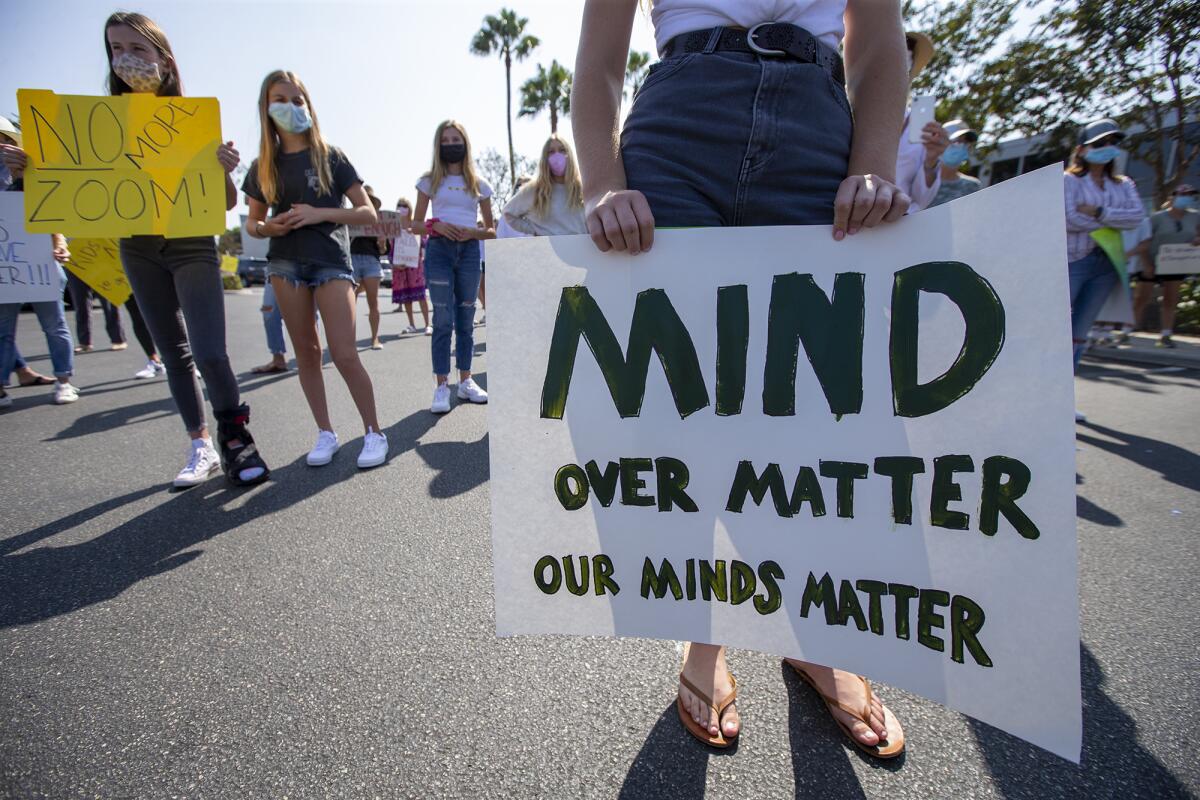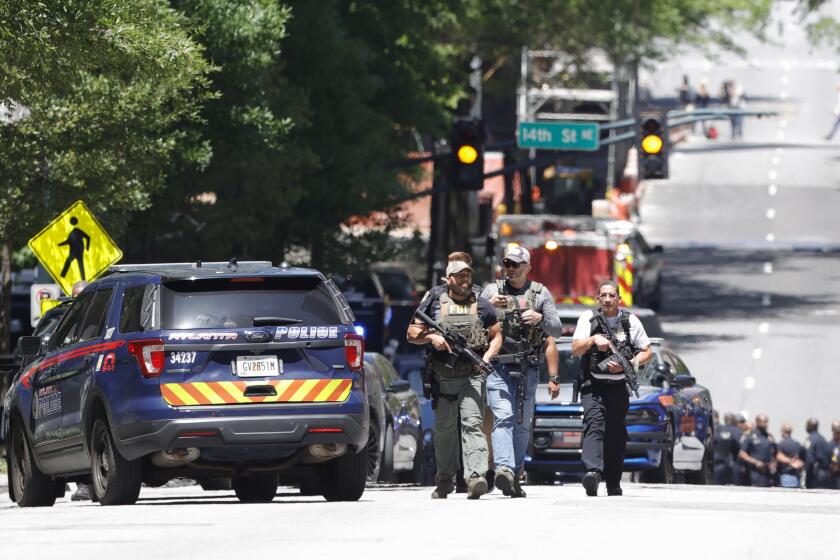Apodaca: Examining the ‘parental rights’ debate in education

- Share via
By today’s distorted standards, Newport-Mesa Unified School District’s recent board meeting was a relatively sedate affair.
During public comments, a few people spoke out against book bans. They were applauded by some in the audience. One person objected to any display of the LGBTQ+ rainbow flag on school property, eliciting enthusiastic applause from others.
Afterwards, a group of women gathered outside exchanged harsh words with a couple of the anti-book ban commenters, and loudly expressed their dissatisfaction with Supt. Wesley Smith’s measured remarks. Still, not a particularly high reading on the contentiousness scale.
Perhaps it was a rare off-night for one of the preferred battlegrounds in the nation’s raging culture wars. Or maybe the Newport Beach City Council’s meeting the same evening had absorbed some of the steam locally. Either way, it was only a temporary reprieve because the conflicts roiling our schools are burning hotter than ever.
Indeed, the fact that it’s notable when histrionics don’t break out shows just how ugly the discourse has become.
Advocates operating under the banner of “parental rights,” fueled by a well-oiled campaign driven by fear and misinformation, are demanding that schools remove books, whitewash curriculum and muzzle classroom discussions. This effort goes far beyond reasonable concerns over the age-appropriateness of some material; virtually all references to history, issues or life stories that so much as touch on race or LGBTQ+ themes are considered repugnant.
Rather than looking upon teachers and administrators as collaborators in providing children with a substantive, balanced education, the “parental rights” forces tend to regard many of these professionals as adversaries attempting to indoctrinate students in social views they find scary.
Acronyms are carelessly bandied about, without any real understanding of what they mean or how they might, or might not, figure into K-12 public education. All we hear is that CRT and DEI are evil, and beyond some misapplied or grossly misinterpreted anecdotes that’s all anyone needs to know.
The bullying tactics are legion. School board members are routinely harassed. Administrators are threatened. Teachers are intimidated.
Some of the accusations are so outlandish that I don’t wish to repeat them. But they are cited as gospel and widely circulated by national organizations and allies in the media who are adept at manipulating information to suit their agendas.
Shaken after an experience in Atlanta, Daily Pilot columnist Patrice Apodaca notes the commonality of gun violence, with close to 18,000 gun-related deaths in the U.S. in the first five months of the year.
To be clear, parents should always be diligent and deeply involved in their children’s education. No one is arguing that.
But when some refer to “parental choice,” what they really mean is “rights for me but not for thee,” since they seek to restrict what all students — not just their own — are allowed to see or hear.
It’s important to remember that parents of public school students already have extensive rights, including opting their children out of certain activities and instruction. What’s happening now is an attempt by some extremists to run the entire system through a fine-mesh sieve that filters out all references that they don’t like.
Compounding the damage, this movement has distracted from the legitimate, serious problems confronting K-12 education, most critically the ongoing struggle to recover from devastating pandemic-related learning losses.
Teacher shortages are another issue made worse by their efforts. Resignation rates in many areas are historically high, and fewer people are joining the field. While low pay and burnout are big factors driving this trend, the politically motivated attacks and censorship drives are also cited as key contributors to educators’ decisions to leave.
Unfortunately, as it now stands, the demands of a small minority who fear evolving societal standards are often overriding the majority who want their children to learn to think, deeply and critically; to examine a range of ideas and backgrounds and to develop informed opinions based on thoughtful consideration of various viewpoints.
I think back to my own public school days and to the classes and programs that had a profound effect on me.
Chief among those was an independent-study literature course that a generous English teacher, enthused by my idea to delve deep into a selection of classic books, agreed to guide me through. That semester I devoured the writings that she suggested, such as Albert Camus’ “The Stranger,” and “Siddhartha” by Hermann Hesse, then wrote reports on my readings and engaged in lively discussions with the teacher.
Not everything sat easily with me. In particular, I found “The Stranger,” with its remorseless main character who believed that life has no meaning, particularly disturbing. But those books prompted me to examine diverse philosophies and cultures and to become more confident in my ability to absorb and analyze different perspectives. It was one of the best educational experiences of my life.
Decades later, I try to keep learning and growing, and I continue to read books that open my eyes to backgrounds and communities outside my own bubble.
There was a time, for instance, when I’d never heard of transgender. Now I understand that trans youth are disproportionately bullied, ostracized and misunderstood, and they have higher rates of depression and suicidal ideation. They deserve empathy and fair treatment, to be seen and heard.
The same applies to anyone who falls outside someone else’s narrow vision of what is normal. Modeling the values that really matter — those of compassion, kindness and inclusivity — should be central to any school’s mission. Educators who embrace that goal should know that there are many of us standing with them against the onslaught of intolerance.
All the latest on Orange County from Orange County.
Get our free TimesOC newsletter.
You may occasionally receive promotional content from the Daily Pilot.







